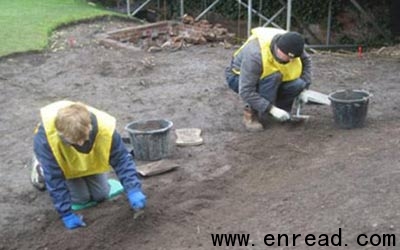英国考古学家发掘莎士比亚故居的垃圾池
(单词翻译:单击)
Archaeologists believe they are on the cusp of shedding new light on the life of William Shakespeare – by digging up what may have been the playwright’s cesspit.
为进一步探究英国戏剧大师威廉·莎士比亚生活的方方面面,考古学家们日前开始发掘这位剧作家故居的垃圾池。

The dig focuses on three areas of the property, which Shakespeare bought in 1597.
Experts have begun excavating1(挖掘) the ruins of New Place, Shakespeare’s former home in Stratford-upon-Avon, which was demolished2(拆毁,破坏) 250 years ago.
Although little remains3 of the property, the team, led by Birmingham Archaeology4, believes it has identified a rubbish tip or cesspit(垃圾坑,污水坑) used by the 16th century poet.
Fragments of pottery5(陶器) and broken clay pipe have already been retrieved6(取回,恢复) from a muddy hole on the site, which they claim could yield some of the most significant discoveries about Shakespeare in decades.
The dig focuses on three areas of the property, which Shakespeare bought in 1597 when he returned to his home town from London having achieved fame – including the so-called knot garden(设计精致的花园) at the rear(后面) of the building.
Dr Diana Owen, Director of the Shakespeare Birthplace Trust, which owns the site, said: “We do not know if the knot garden was an area used by Shakespeare – it may have been a yard simply used by his servants.
“But this could actually yield some fantastic results, especially if it was an area where rubbish was thrown or the cesspit was located.”
Kevin Colls, from Birmingham Archaeology, added: “Through documentary evidence we know Shakespeare lived at New Place but we have very little information regarding the layout of the house and gardens at this time.
“Through archaeological(考古学的) fieldwork, in particular the excavation7 of structural8 remains and the recovery of artefacts(人工制品,加工品) , we hope to fill in the blanks.
“Even the smallest sherd(破片,碎片) of broken pottery has the potential for giving us tantalising(挑逗的,诱人的) glimpses into the life of Shakespeare such as what he liked to eat and drink.”
Until October, visitors will be able to watch archaeologists and volunteers at work as they excavate9 the remains of the house, which was knocked down in 1759.
Experts hope to unearth10 evidence to support theories that Shakespeare wrote many of his most famous works at the property.
 收听单词发音
收听单词发音
1
excavating

|
|
| v.挖掘( excavate的现在分词 );开凿;挖出;发掘 | |
参考例句: |
|
|
|
2
demolished

|
|
| v.摧毁( demolish的过去式和过去分词 );推翻;拆毁(尤指大建筑物);吃光 | |
参考例句: |
|
|
|
3
remains

|
|
| n.剩余物,残留物;遗体,遗迹 | |
参考例句: |
|
|
|
4
archaeology

|
|
| n.考古学 | |
参考例句: |
|
|
|
5
pottery

|
|
| n.陶器,陶器场 | |
参考例句: |
|
|
|
6
retrieved

|
|
| v.取回( retrieve的过去式和过去分词 );恢复;寻回;检索(储存的信息) | |
参考例句: |
|
|
|
7
excavation

|
|
| n.挖掘,发掘;被挖掘之地 | |
参考例句: |
|
|
|
8
structural

|
|
| adj.构造的,组织的,建筑(用)的 | |
参考例句: |
|
|
|
9
excavate

|
|
| vt.挖掘,挖出 | |
参考例句: |
|
|
|
10
unearth

|
|
| v.发掘,掘出,从洞中赶出 | |
参考例句: |
|
|
|
- 上一篇:世界上最大兔子长达1.29米
- 下一篇:台湾版苏珊·博伊尔“林育群”一夜间走红网络




